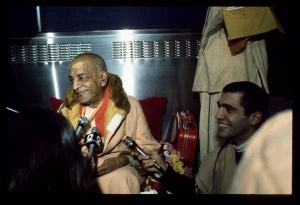SB 3.8.22: Difference between revisions
m (1 revision(s)) |
No edit summary |
||
| Line 1: | Line 1: | ||
{{info | {{info | ||
|speaker=Maitreya | |speaker=Maitreya Ṛṣi | ||
|listener=Vidura | |listener=Vidura | ||
}} | }} | ||
[[Category:Srimad-Bhagavatam - Canto 03 Chapter 08]] | |||
[[Category:Bhagavatam Verses Spoken by Maitreya Rsi - Vanisource|030822]] | |||
<div style="float:left">'''[[Srimad-Bhagavatam]] - [[SB 3|Third Canto]] - [[SB 3.8: Manifestation of Brahma from Garbhodakasayi Visnu|Chapter 8: Manifestation of Brahmā from Garbhodakaśāyī Viṣṇu]]'''</div> | |||
<div style="float:right">[[File:Go-previous.png|link=SB 3.8.21]] '''[[SB 3.8.21]] - [[SB 3.8.23]]''' [[File:Go-next.png|link=SB 3.8.23]]</div> | |||
{{RandomImage}} | |||
==== TEXT 22 ==== | ==== TEXT 22 ==== | ||
<div | <div class="verse"> | ||
kālena so 'jaḥ puruṣāyuṣābhi- | :kālena so 'jaḥ puruṣāyuṣābhi- | ||
pravṛtta-yogena virūḍha-bodhaḥ | :pravṛtta-yogena virūḍha-bodhaḥ | ||
svayaṁ tad antar-hṛdaye 'vabhātam | :svayaṁ tad antar-hṛdaye 'vabhātam | ||
apaśyatāpaśyata yan na pūrvam | :apaśyatāpaśyata yan na pūrvam | ||
</div> | </div> | ||
| Line 16: | Line 22: | ||
==== SYNONYMS ==== | ==== SYNONYMS ==== | ||
<div | <div class="synonyms"> | ||
''kālena''—in due course of time; ''saḥ''—he; ''ajaḥ''—the self-born Brahmā; ''puruṣa-āyuṣā''—by the duration of his age; ''abhipravṛtta''—being engaged; ''yogena''—in meditation; ''virūḍha''—developed; ''bodhaḥ''—intelligence; ''svayam''—automatically; ''tat antaḥ-hṛdaye''—in the heart; ''avabhātam''—manifested; ''apaśyata''—saw; ''apaśyata''—did see; ''yat''—which; ''na''—not; ''pūrvam''—before. | |||
</div> | </div> | ||
| Line 23: | Line 29: | ||
==== TRANSLATION ==== | ==== TRANSLATION ==== | ||
<div | <div class="translation"> | ||
At the end of Brahmā's one hundred years, when his meditation was complete, he developed the required knowledge, and as a result he could see in his heart the Supreme within himself, whom he could not see before with the greatest endeavor. | At the end of Brahmā's one hundred years, when his meditation was complete, he developed the required knowledge, and as a result he could see in his heart the Supreme within himself, whom he could not see before with the greatest endeavor. | ||
</div> | </div> | ||
| Line 30: | Line 36: | ||
==== PURPORT ==== | ==== PURPORT ==== | ||
<div | <div class="purport"> | ||
The Supreme Lord can be experienced only through the process of devotional service and not by one's personal endeavor in mental speculation. The age of Brahmā is calculated in terms of divya years, which are distinct from the solar years of human beings. The divya years are calculated in Bhagavad-gītā ([[BG 8.17]]): sahasra-yuga-paryantam ahar yad brahmaṇo viduḥ. Brahmā's one day is equal to one thousand times the aggregate of the four yugas (calculated to be 4,300,000 years). On that basis, Brahmā meditated for one hundred years before he could understand the supreme cause of all causes, and then he wrote the Brahma-saṁhitā, which is approved and recognized by Lord Caitanya and in which he sings, govindam ādi-puruṣaṁ tam ahaṁ bhajāmi | The Supreme Lord can be experienced only through the process of devotional service and not by one's personal endeavor in mental speculation. The age of Brahmā is calculated in terms of ''divya'' years, which are distinct from the solar years of human beings. The ''divya'' years are calculated in [[Bhagavad-gita As It Is (1972)|''Bhagavad-gītā'']] ([[BG 8.17 (1972)|BG 8.17]]): ''sahasra-yuga-paryantam ahar yad brahmaṇo viduḥ''. Brahmā's one day is equal to one thousand times the aggregate of the four ''yugas'' (calculated to be 4,300,000 years). On that basis, Brahmā meditated for one hundred years before he could understand the supreme cause of all causes, and then he wrote the ''Brahma-saṁhitā'', which is approved and recognized by Lord Caitanya and in which he sings, ''govindam ādi-puruṣaṁ tam ahaṁ bhajāmi''. One has to wait for the mercy of the Lord before one can either render service unto Him or know Him as He is. | ||
</div> | </div> | ||
__NOTOC__ | |||
<div style="float:right; clear:both;">[[File:Go-previous.png|link=SB 3.8.21]] '''[[SB 3.8.21]] - [[SB 3.8.23]]''' [[File:Go-next.png|link=SB 3.8.23]]</div> | |||
__NOTOC__ | |||
__NOEDITSECTION__ | |||
Revision as of 16:03, 4 May 2021

A.C. Bhaktivedanta Swami Prabhupada
TEXT 22
- kālena so 'jaḥ puruṣāyuṣābhi-
- pravṛtta-yogena virūḍha-bodhaḥ
- svayaṁ tad antar-hṛdaye 'vabhātam
- apaśyatāpaśyata yan na pūrvam
SYNONYMS
kālena—in due course of time; saḥ—he; ajaḥ—the self-born Brahmā; puruṣa-āyuṣā—by the duration of his age; abhipravṛtta—being engaged; yogena—in meditation; virūḍha—developed; bodhaḥ—intelligence; svayam—automatically; tat antaḥ-hṛdaye—in the heart; avabhātam—manifested; apaśyata—saw; apaśyata—did see; yat—which; na—not; pūrvam—before.
TRANSLATION
At the end of Brahmā's one hundred years, when his meditation was complete, he developed the required knowledge, and as a result he could see in his heart the Supreme within himself, whom he could not see before with the greatest endeavor.
PURPORT
The Supreme Lord can be experienced only through the process of devotional service and not by one's personal endeavor in mental speculation. The age of Brahmā is calculated in terms of divya years, which are distinct from the solar years of human beings. The divya years are calculated in Bhagavad-gītā (BG 8.17): sahasra-yuga-paryantam ahar yad brahmaṇo viduḥ. Brahmā's one day is equal to one thousand times the aggregate of the four yugas (calculated to be 4,300,000 years). On that basis, Brahmā meditated for one hundred years before he could understand the supreme cause of all causes, and then he wrote the Brahma-saṁhitā, which is approved and recognized by Lord Caitanya and in which he sings, govindam ādi-puruṣaṁ tam ahaṁ bhajāmi. One has to wait for the mercy of the Lord before one can either render service unto Him or know Him as He is.